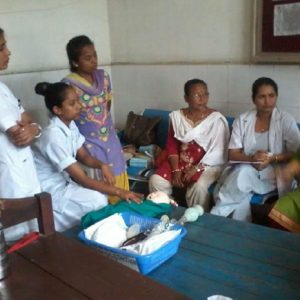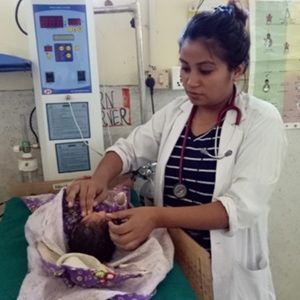The project ‘Improving Maternal and Newborn Health (MNH) with a focus on emergency obstetric and newborn care (EmONC) and the referral system” aims to systematically improve the quality of basic and comprehensive emergency obstetric and newborn care at the decentralised district level by supporting continued skills development, facility quality improvement and the development of a functioning referral system.
M4h is leading the consortium composed of Evaplan and Options to support a comprehensive integrated systemic approach to Quality Improvement (QI).
The project works in three fields of activity:
- Improve the quality and availability of emergency obstetric and newborn care
- Enhance institutional capacity for facility management and quality improvement
- Improve the referral system for equitable access to emergency obstetric and newborn care
Nurses and Doctors have limited opportunities for continuous professional development beyond pre-service training and have a limited access to experienced clinicians from whom junior staff can learn key skills. Refresher trainings alone do not translate into improved service delivery. Mentoring provides the bridge between traditional didactic training to hands-on practical training approaches
In the absence of continuing medical education, skills acquired during pre-service training are usually lost. Through this approach, key essential MNCH skills imparted through the mentoring approach enabled nurses to effectively perform tasks that they did not feel confident in practicing, either due to lack of knowledge, hands-on practical skills or both.
Mentoring visits were planned according to the SBM-R process. During the first mentoring visit of health facility sites, a comprehensive assessment of the is done, to set the baseline situation of each site. This assessment included a knowledge assessment of the staff providing MNCH care. A mentoring session followed this skills assessment, in order to demonstrate how to perform the MNCH procedures that were not mastered by the health staff. Well performing staff were acknowledged individually and encouraged to pursue their efforts. The visit was closed by the preparation of quality improvement plan of action to address the main quality issues identified during the visit.
The mentoring intervention, integrated on-site clinical mentoring with facility-based quality improvement processes
- As the mentoring is offered on-site, with plenty of handholding, use of mannequins and supportive supervision, this generated confidence among participants and enabled them to perform these clinical practices.
- The programme has generated a significant improvement in knowledge, skills and in the management of critical maternal and neonatal cases.





